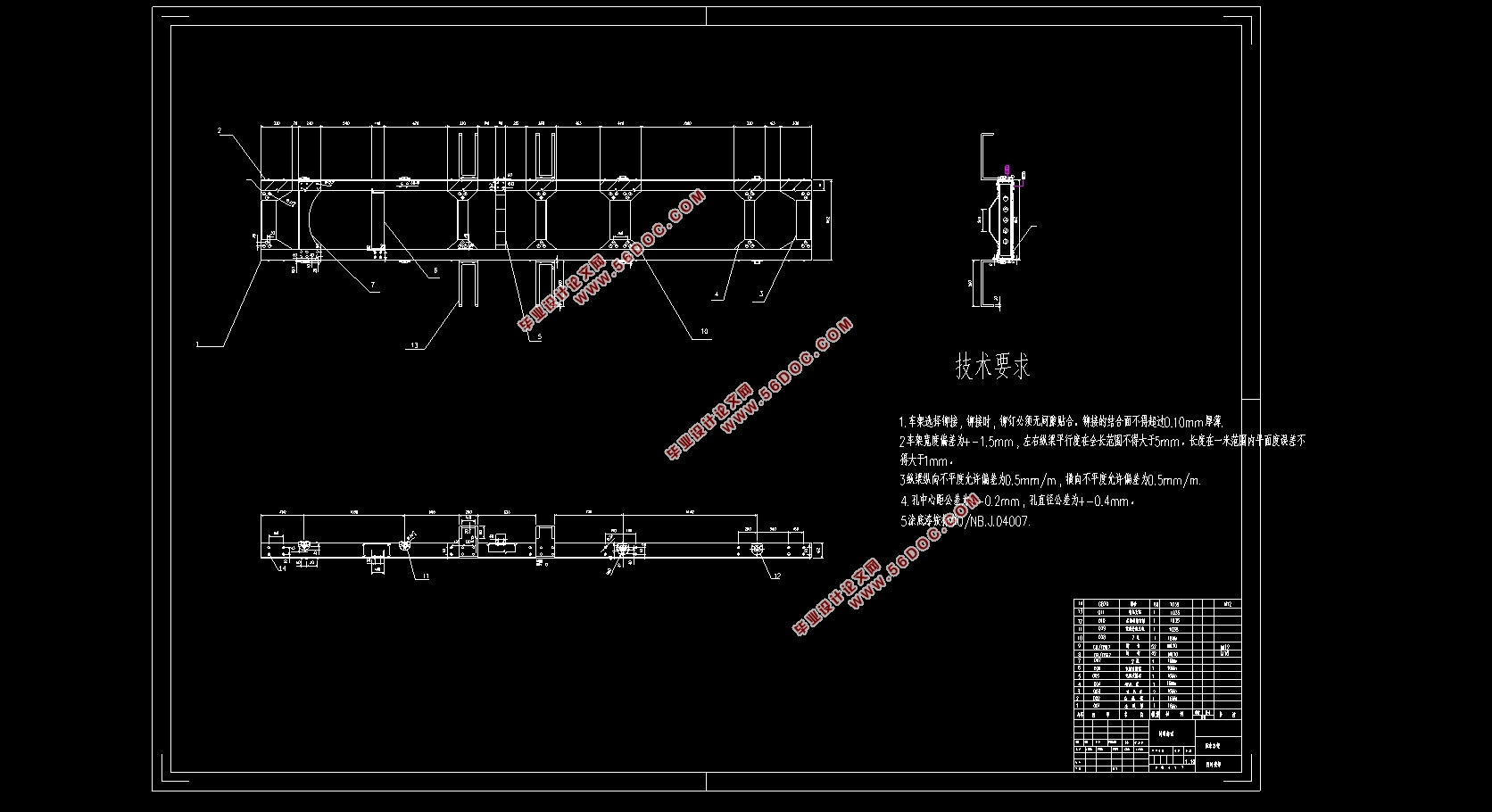6t纯电动轻型载货车车架总成设计(英文版)(含CAD零件图装配图)
来源:wenku7.com 资料编号:WK718846 资料等级:★★★★★ %E8%B5%84%E6%96%99%E7%BC%96%E5%8F%B7%EF%BC%9AWK718846
以下是资料介绍,如需要完整的请充值下载。
1.无需注册登录,支付后按照提示操作即可获取该资料.
2.资料以网页介绍的为准,下载后不会有水印.资料仅供学习参考之用. 密 保 惠 帮助
资料介绍
6t纯电动轻型载货车车架总成设计(英文版)(含CAD零件图装配图)(任务书,开题报告,论文说明书英文版9000字,CAD图6张)
摘 要
本文研究的是电动载货车车架,由于传统汽车对环境的不友好并且已经达到了发展瓶颈,越来越多的研究都趋向于电动货车。电动货车多数采用国外先进的电机和控制技术,使其具有载重量大、动力更加强劲的特点,大容量电池更保证了其超长的续驶里程,超强的底盘设计使其安全性能更加稳定。底盘的主题是车架,他是汽车的基体,通常的是由两根纵梁和几根横梁组成的,经过悬挂装置﹑前桥﹑后桥支承在车轮上。拥有足够的刚度和强度来承受汽车的载荷和从车轮传来的冲击,因此车架的刚度和强度在汽车整体设计中起着非常重要的作用。论文主要研究了轻型载货汽车的车架总成设计,本文对车架进行了三维建模并用ansys做了有限元分析。
关键词:电动载货车;车架;三维建模;有限元分析
Abstract
The frame of electric truck is studied in this paper. Because the traditional vehicle is not friendly to the environment and has reached the bottleneck of development, more and more research tends to electric truck. Most of the electric trucks adopt foreign advanced motor and control technology, which makes them have the characteristics of large load and stronger power. The large capacity battery guarantees its long driving range, and the strong chassis design makes its safety more stable. The theme of the chassis is the frame, which is the base of the car. Usually it is composed of two Frame rails and several crossmember. It is supported on the wheels by suspension device, front axle and rear axle. With enough stiffness and strength to withstand the load of the car and the impact from the wheel, the stiffness and strength of the frame plays a very important role in the overall design of the car. This paper mainly studies the frame assembly design of light truck. In this paper, the three-dimensional model of the frame is built and the finite element analysis is done with ansys.
Key Words:electric truck;frame;3d model;finite element analysis


List
Chapter 1 Introduction........................................................................................................................1
1.1 Research background of electric truck.........................................................................................1
1.2 Research status of electric truck...................................................................................................1
1.2.1 Current status of foreign research..............................................................................................1
1.2.2 Current status of domestic research...........................................................................................2
1.3 Research background of frame design..........................................................................................2
1.4 Research Purpose and Significance..............................................................................................3
1.5 Basic content and objectives.........................................................................................................3
Chapter 2 Types and Parameters of Electric Freight Vehicles.............................................................4
2.1 Electric truck model.......................................................................................................................4
2.2 Vehicle parameters.........................................................................................................................4
2.2.1 Body parameter...........................................................................................................................4
2.2.2 Motor parameters........................................................................................................................4
2.2.3 Container parameters..................................................................................................................5
Chapter3 Frame Design.......................................................................................................................6
3.1 Frame Design Requirements..........................................................................................................6
3.2 Force Type of Frame......................................................................................................................7
3.3 Types of Frame...............................................................................................................................7
3.4 Types of crossmember and Frame rails..........................................................................................8
3.5 Structural Design of Frame rail......................................................................................................9
3.5.1 Selection of Frame Length and Material.....................................................................................9
3.5.2 Calculating the Section Size of Frame rail..................................................................................9
3.5.3 Design and Strength Check of Frame rail.................................................................................11
3.5.4 Rigidity Check of Frame rail....................................................................................................13
3.6 Establishment of Three-Dimensional Frame Model....................................................................15
3.6.1 Establishment and View of Three-dimensional Model.............................................................15
3.6.2 Modeling of Frame rail.............................................................................................................15
3.6.3 Modeling of Front crossmember...............................................................................................16
3.6.4 Modeling of Supporting crossmember......................................................................................16
3.6.5 Modeling of Steel panel...........................................................................................................17
3.6.6 Modeling of middle and rear crossmembers.............................................................................17
3.6.7 General Assembly Model..........................................................................................................18
3.7 conclusion....................................................................................................................................18
Chapter4 Finite Element Analysis......................................................................................................19
4.1 finite element modeling..............................................................................................................19
4.2 finite element static analysis.......................................................................................................19
4.2.1 bendingconditions...................................................................................................................20
4.2.2 Torsional conditions.................................................................................................................21
4.2.3 emergency brake conditions.....................................................................................................22
4.3 finite element modal analysis......................................................................................................23
4.4 conclusion....................................................................................................................................26
Chapter5Improvement model...........................................................................................................27
5.1 Improvement scheme...................................................................................................................27
5.2 Improvement model.....................................................................................................................27
5.2.1 front and rear crossmember.......................................................................................................27
5.2.2 Front Support Plate crossmember of Rear Suspension.............................................................27
5.2.3 Secondcrossmemberagainst torsion........................................................................................28
5.2.4 new assembly frame..................................................................................................................28
5.3 Simulation test.............................................................................................................................29
5.3.1 bendingconditions...................................................................................................................29
5.3.2 Torsional conditions..................................................................................................................29
5.4 conclusion....................................................................................................................................30
Reference...........................................................................................................................................31
Thanks................................................................................................................................................32
|





